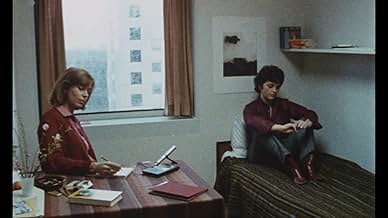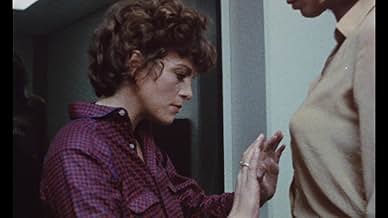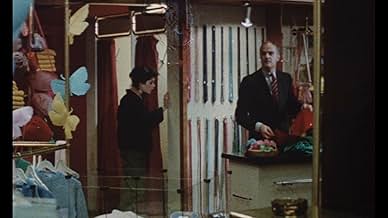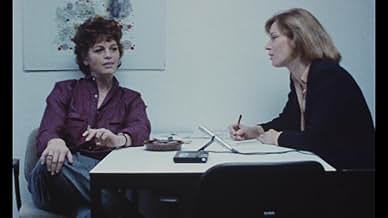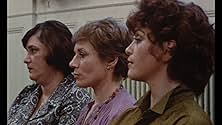AVALIAÇÃO DA IMDb
6,7/10
1,3 mil
SUA AVALIAÇÃO
Adicionar um enredo no seu idiomaThree women of no previous acquaintance suddenly kill a male shopkeeper in the middle of the day. The female psychiatrist assigned to the case sets out to understand why.Three women of no previous acquaintance suddenly kill a male shopkeeper in the middle of the day. The female psychiatrist assigned to the case sets out to understand why.Three women of no previous acquaintance suddenly kill a male shopkeeper in the middle of the day. The female psychiatrist assigned to the case sets out to understand why.
- Prêmios
- 3 vitórias e 2 indicações no total
Eddie Brugman
- Echtgenoot
- (as Eddy Brugman)
Avaliações em destaque
To call this movie hate literature is one thing, but the analogy used referencing Jews and Nazis is completely not applicable here. This is a film about power, domination, and oppression, all three of which men exercise over women in our society. One would have to live in a bubble to say that Jews hold the same position over non-Jews or Nazis (or did pre-WWII)! As a Jew, I find your comment mildly offensive, and as a man (while it is always difficult to recognize one's privilege), I find this film to be an amazing critique of patriarchy. While murder may not be the solution, this film shows the extraordinary way in which 3 women who have been beaten down their whole lives (and have nothing to lose) attempt to fight back against an enemy that is unbeatable. The laughter at the end of this film proves just who gets it and who doesn't. PS- I've heard that in some places during the initial screenings of this film, women in the theaters actually broke out in laughter with the women on screen during the court scene....
9SM-4
A Question of Silence is a moving film about three women who commit a horrible, violent crime and about the establishment's attempts to understand their motive. Without forethought and without knowing one another, they attack and kill a boutique owner in cold blood. The film follows the psychiatrist (played by Cox Habbema) as she interviews the incarcerated women. The major conflict comes from the women's refusal to state their motive, whence the title. Everyone assumes they must be insane, because to admit otherwise (and this is the conclusion to which the psychiatrist finally comes) is to admit that the world is a very bad place for women, indeed.
The film is hard to watch, especially, I would imagine, for men. But it by no means glorifies the murder or the murderers. Nor do the murderers find "overwhelming public support" at their trial. What they find is willful incomprehension on the part of the men who arrest them, try them and testify against them. Because what they have done cannot be understood in the context of any existing cultural system, including language, the women can only laugh as their sentence is pronounced. Their laughter is frightening, irrational and yet somehow gives shape to a different kind of logic.
The film is hard to watch, especially, I would imagine, for men. But it by no means glorifies the murder or the murderers. Nor do the murderers find "overwhelming public support" at their trial. What they find is willful incomprehension on the part of the men who arrest them, try them and testify against them. Because what they have done cannot be understood in the context of any existing cultural system, including language, the women can only laugh as their sentence is pronounced. Their laughter is frightening, irrational and yet somehow gives shape to a different kind of logic.
This film is NOT anti-male. It is not suggesting that women go out and randomly kill men just for being of that gender. What is does do is use a wonderful technique called reversal. If three men had brutalized a woman, well, "society" might not find that so shocking (maybe more now than earlier years, but certainly not as shocking as the reverse). It doesn't want to start propaganda, it wants to make you THINK. By making the therapist think on it, it forces the viewer to think on it as well. What's the history of women being brutalized and then remaining quiet about it? Have women really achieved the social, political, and economic equality that is the feminist goal? Why not? This movie doesn't hate men; it simply loves women enough to give everyone something to think about.
Very powerful and thoughtful. Much superior to Gorris' more-acclaimed Antonia's Line, in my opinion. This film has none of the cutesiness of Antonia but all of the thoughtfulness and thematic weight. The theme is a subtle examination of the roles of men and women in Dutch society, and I guess it could apply to many societies. The film has a viewpoint, but it problematizes and complicates matters so that it's impossible for the viewer to blindly accept that viewpoint. It examines SUBTLE discrimination and dehumanization.
The only frustration I had was the fact that the copy I viewed did not give subtitles to a lot of the dialogue--e.g., a woman listens to the radio for about a minute, but non-Dutch speakers (like myself) don't understand any of it, and I'm guessing that with a filmmaker as careful as Gorris, this dialogue is important.
The only frustration I had was the fact that the copy I viewed did not give subtitles to a lot of the dialogue--e.g., a woman listens to the radio for about a minute, but non-Dutch speakers (like myself) don't understand any of it, and I'm guessing that with a filmmaker as careful as Gorris, this dialogue is important.
After watching this film, I was forced to come search for what others had taken from it. I was shocked and jarred, however, at the heteroglossia present. SM-4 from Alabama wrote that, "Everyone assumes they must be insane, because to admit otherwise is to admit that the world is a very bad place for women, indeed." While it may be possible to interpret the film in this way and it may even be the intended interpretation, it strikes me as disingenuous. Though the court and justice system's appearing inability to imagine these women as competent is a form of sexism, it does not point to a "world (that) is a very bad place for women." Indeed, three white men not too long ago in America might have met in a store with a black man and beat him to death. According to SM-4's logic, the world would be a very bad place for white men also.
Just because one racial group, religious group, or gender strikes out at those whom they feel oppressed, threatened, or harmed by, that does not prove that those feeling of oppression, injury, or injustice are valid. In some cases, mitigating evidence may exist. In A Question of Silence, however, I found none.
Just because one racial group, religious group, or gender strikes out at those whom they feel oppressed, threatened, or harmed by, that does not prove that those feeling of oppression, injury, or injustice are valid. In some cases, mitigating evidence may exist. In A Question of Silence, however, I found none.
Você sabia?
- CuriosidadesThe first plant that Nelly Frijda throws during her tantrum can be seen hitting the lens of the camera.
Principais escolhas
Faça login para avaliar e ver a lista de recomendações personalizadas
- How long is A Question of Silence?Fornecido pela Alexa
Detalhes
Bilheteria
- Orçamento
- NLG 300.000 (estimativa)
Contribua para esta página
Sugerir uma alteração ou adicionar conteúdo ausente

